#narrator charlemagne
Text
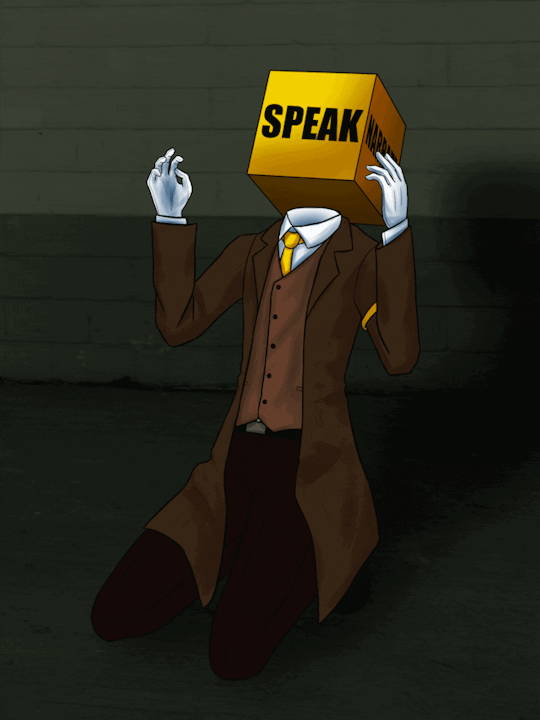
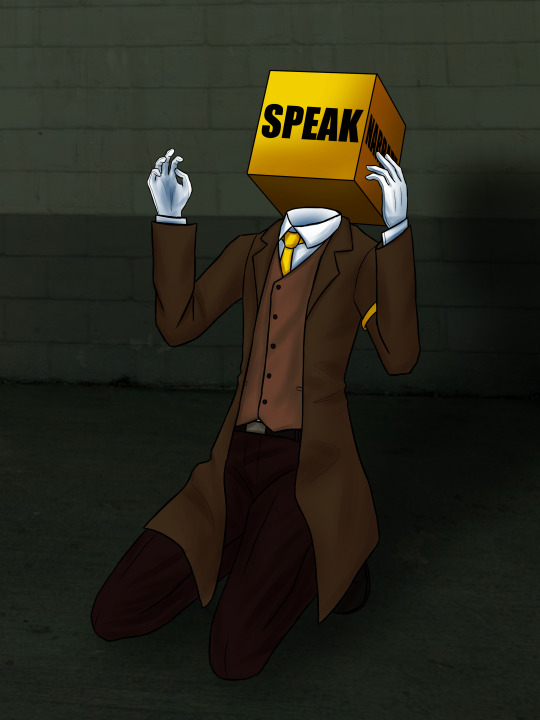
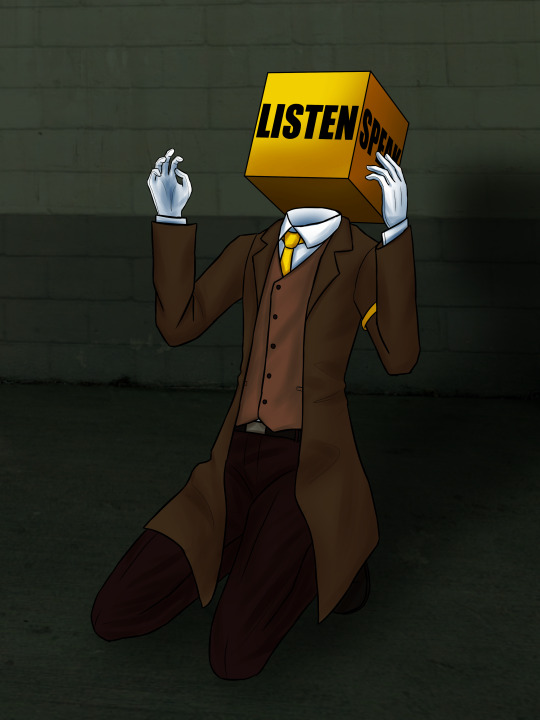
As a break from drawing I did some drawing
Featuring @owlfromthemeadow 's Narrator Charlemagne
And I did a cube turning just because I could haha
Don't question anything. I referenced a pose and slapped the most appropriate background on it I could think of because I didn't want no background lol
Hope you like it whoopsie did my best uwu
#the stanley parable narrator#the stanley parable#tsp#tsp art#tsp narrator#tsp fanart#tspud narrator#admin art#gif cw#narrator charlemagne
146 notes
·
View notes
Text
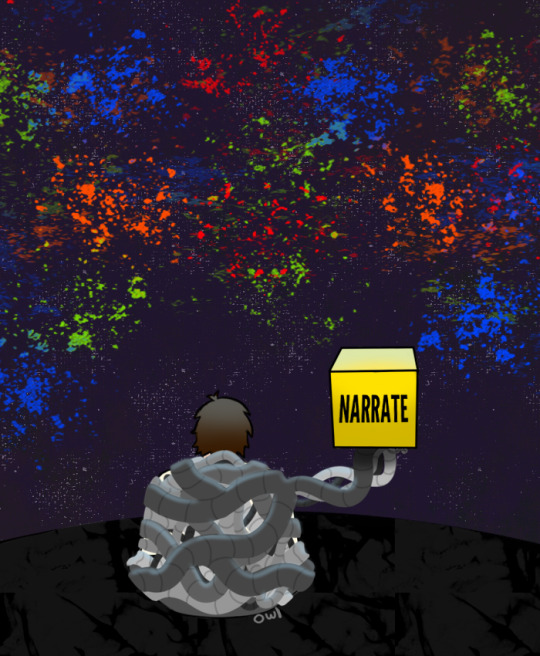
A moment of solace.
Happy Stanley Day everyone! I decided to draw something sweet. :)
#owl's art#my art#charlemagne#tsp#tsp art#tsp narrator#tsp stanley#the stanley parable#artists on tumblr#stanley day 2024#4/27
49 notes
·
View notes
Text
Doodle dump teehee
Featuring @owlfromthemeadow's narrator, Charlemagne (cube head guy)



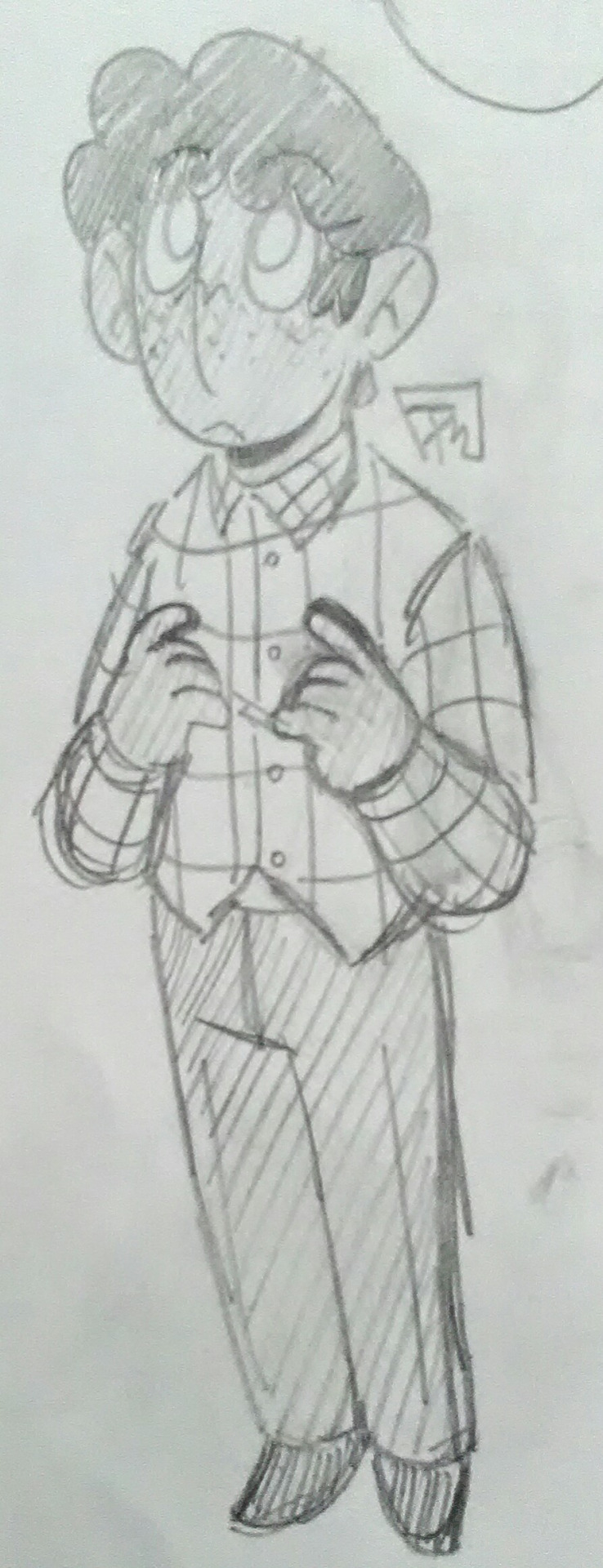


CATWIN
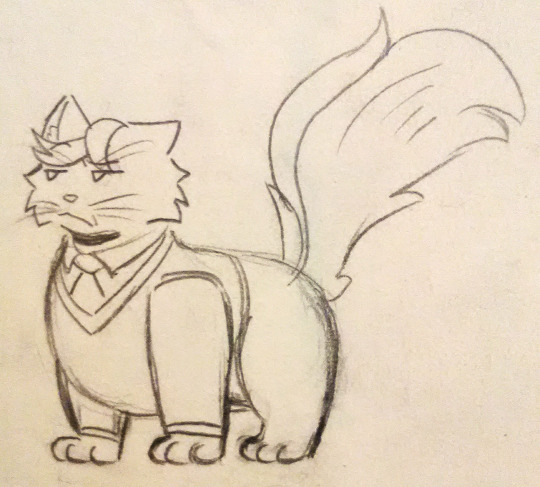
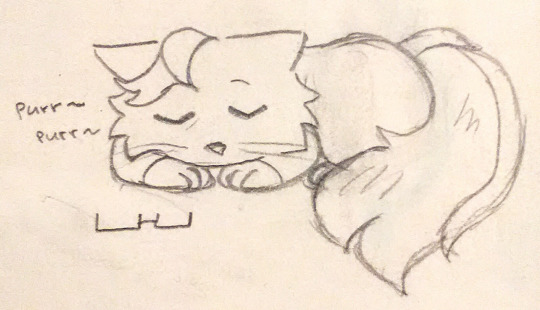


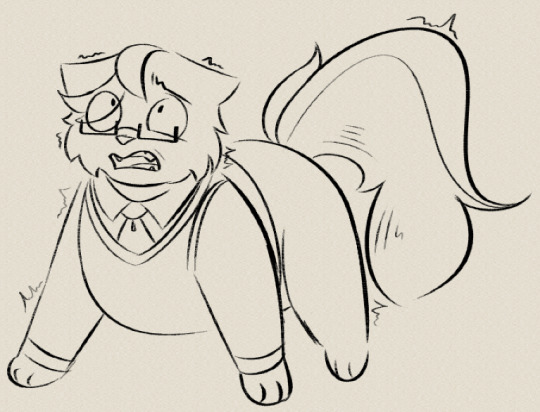

#CATWIN#Does this count as furry?#the stanley parable#tsp#tspud#tsp narrator#tsp fanart#stanley parable ultra deluxe#narrator tsp#art#fanart#machi's art#tsp stanley#tsp curator#cat#drawing#doodle#traditional art#character design
75 notes
·
View notes
Text
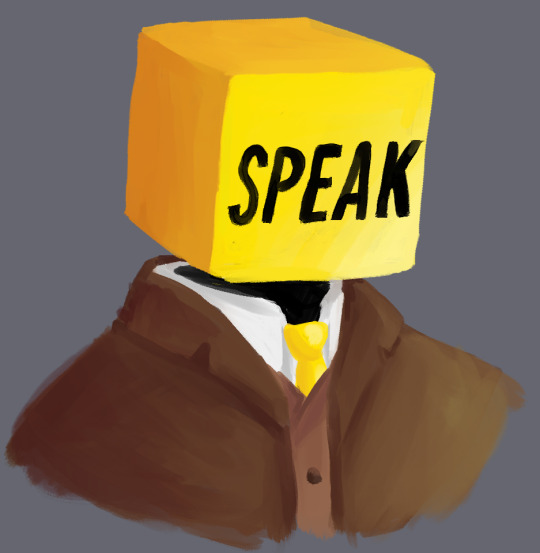
Cube cube cube CUBE CUBE CUBE CUBE CU-
@owlfromthemeadow's Narrator, Charlemagne
#tsp#the stanley parable#stanley parable ultra deluxe#tsp narrator#narrator tsp#art#tsp fanart#fanart#tspud#LilyDoesDrawArt
79 notes
·
View notes
Note
Where do you think Mt. Ebott is on Earth? Most seem to consider somewhere in the United States or Canada as the most probable answer, though that makes sense considering the majority of the fan base is from their and Toby himself is an american (also Hometown in Deltarune is pretty obviously supposed to invoke the image of Everytown, America).
That said, I'm pretty sure the medieval weapons used by the humans in the intro don't line up with what indigenous Americans had access to.
So maybe somewhere in Europe? Would fit with the vaguely medieval esthetic of thr Underground, and Asgore's theme being a reference to the german King in the Mountain motif.
A very tricky question !
Indeed, Undertale seems to be throwing hints into every direction at once. The name "Frisk" comes from Scandinavia whilst "Chara" exists in Irish and Greek. The narrator references the USDA (US department of agriculture), the underground references medieval Europe and german myths. Etc... the list goes on and there seems to be no easy answer.
Mount Ebbot lookalikes have also been found in most of these countries...
To start off, the kind of sword that we see in the introduction of the game indeed doesn't really fit with what native americans were using before europeans discovered the continent. They mainly used weapons such as bows and arrows, spears or tomahawks... Not this :

It is difficult to judge such a generic sword design, but this type of sword seems to ressemble a lot more those used in Europe from ancient Greece to the end of the medieval age than those used in Asia in this time period.
Its uncertain how long ago monsters were sealed. Bratty and Catty mention it as having been millennia, however, those two are often exaggerating things. That being said, as it is the only proper source we have on the matter, i believe we can assume that the order of magnitude they give must at least be somewhat accurate.
Another thing that may be relevant is the fact that the sound of the bells that play in the final corridor is called "mus_churchbell".

With that on top of the obvious ressemblence with christian church designs in this area, it would seem likely that christianity was already present in the area Undertale takes place in back when monsters were sealed.

In that case, most of Africa and Asia as well as all of the Americas and Oceania would be eliminated, making Europe the biggest candidate by far.
It could also be possible that monsters learned of christianity at a later date via things the humans would have left in the garbage dump. But as monsters only moved out of Home shortly before Chara fell, it would be quite odd for it to have gained much significance underground.
Besides, monsters do not even seem to know about the modern Christmas traditions. Which they would have likely learned about if they only knew of christianity from the dump.
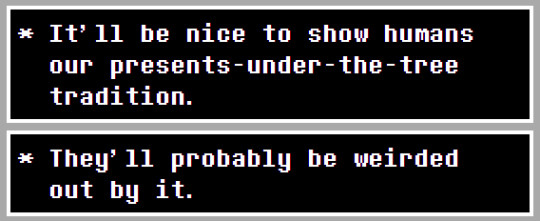
Christmas as a holiday didn't really take off before Charlemagne in the year 800. And it didn't reach its modern form before the 19th century.
As you've pointed out, there is an odd use of the german language in the Undertale OST. One that references german folklore : "Bergentrückung".
This may be a point in favor of Undertale taking place somwhere where german culture has at least a strong influence if not an area where German is spoken.
The narrator knowing what the USDA is and making anime references also seems to imply it being somewhere in the western-aligned world.
Of course, it is likelier to be somewhere that has a lot of mountains as well.
While this one is a bit more of a stretch, a place where a lot of trash per habitant is produced could also be quite fitting due to how much the garbage dump seems to receive.
There is no definitive answer to this question. However, certain areas seem much more likely than others. It would seem to me that somewhere in the Alps would combine the most fitting factors out of any other place on Earth.
Switzerland in particular seems like a very good candidate as it fits every single one of these criteria. Besides, it is also famous for its chocolate ! Which could explain Chara's taste for it if they were swiss.
100 notes
·
View notes
Text
Madame Putiphar Readalong. Book Two, Chapter XXII:
The banality of Evil

detail from James Gillroy's A Voluptuary Under the Horrors of Digestion
From Villepastour’s Castle to Putiphar’s lair we go. Patrick jumps to and fro like a pawn in a board game. No time to catch his breath from the intensity he just endured at Gave’s, he is already on his knees, kissing the hem of Putiphar dress, once again ready to kiss more of her, in order to get her not to deport his undeserving friend Fitz-Harris, who Putiphar affirms, should be more than happy to be set free (let us bear in mind that the man, despite his many flaws, had only sang a stupid song) He gives her what she wants. He needs all the powerful friends he can get (is he thinking also of asking her help in securing his position on the musketeers/clearing his slate?). The chapter is for now, almost a perfect refelection of Chapter XIX, but it skillfully lets reader expectations down. Those expecting another eroticosymbolist scene between Patrick and Putiphar, with the poetry of the kiss and Patrick’s both skilled and naif manipulation, will be disappointed: we are given something diametrically opposed to that. Farce.
Madame Putiphar is in Petrus eyes, the de facto queen of France. As Patrick comes to his appointment, ministers are leaving after a meeting with her, her desk full of maps, plans, treaties, etc. What is the actual king of France doing? Cooking.
The ridiculousness of the situation is evident. The man who is supposed to be the most powerful in France sends his mistress to do his work while he’s all messy, dressed as a cook (a typically femenine and proletarian occupation, even if cuisine was Alexandre Dumas’ hobby, he was seen as super extravagant for cooking for his guests)(If inversion of gender roles seem to be completely positive when it’s Debby and Patrick having qualities traditionally thought of as pertaining to the opposite gender, or the narrator remarkably stating the feminine education has only improved Patrick, the inversion is completely ridiculous and negative here)
After Pharaon’s farcical intervention (calling out for his beloved Pompon, dressed as a cook, not at all sure if the political council was over yet, not at all surprised at assuming Pompadour is with a lover, delighted at the prospect of her trying his eggs, proud at his subjects revering and recognizing him even while dressed as a kitchen boy (“emasculated” and de-ennobled too) we get not only a parody of the King, but a high parody of Patrick (we are not used to see the narrator mock his protagonists. But, just look at this:
“As soon as Patrick was outside, thick tears ran from his eyelids! sensitive and great, he had been shaken all the way to his entrails, seeing what had been done to his King.
And his heart broke, and his tears doubled, when as he crossed a gallery adorned with paintings, his eyes met Louis IX and Charlemagne!” (tr. via @sainteverge ) )
Patrick seems to embody here a parody of a belief many contemporary to Borel royalists held: that the olde monarchies were a lost golden age, and that monarchy fell because of bad execution (basically what Janin says in his review, defending la Pompadour from Borel’s “attack” only to condemn Louis XV, claiming the people didn’t like monarchy because it wasn’t done right to them!)(there is a right way to do monarchy according to those guys, you just have to look at people like Louis XIV, a big fave who Borel doesn’t mention, Charlemagne, and I guess Louis IX)
However, even if the narrator had not mocked Patrick before, he had always had elements of a Candide/Justine type of character. He’s the naif hero who still believes in the world as a lawful place, that the laws of the status quo exist for the greater good (despite hating imperial England’s domain of Ireland) still believes in the natural good of the crown and the church, only to be brutally disillusioned.
But back to the King and his de facto Queen. These are the people who manage the fates of an entire nation? This is how much attention they pay to matter of the state??? This are the super-villains who could snap the lives of our heroes out just like that if they wanted to? As in other romantic novels (can’t help of thinking of the Vautrin novels, where his mental and physical strength can do very little -on occasion!!- against the more inept and gray employees of the state who are his opponents) the personal qualities of the heroes can do very little against social roles, and sometimes their opponents are far less than them, and yet they will win. Patrick is an epic poem of a main character both in his qualities and his appearance. And his opponents are so terribly prosaic. So banal. So base. Completely devoid of poetry. They live to eat and fuck, and avoid work (Pompadour seems more serious about handling the state to be fair). And yet they are antagonists not really because of any personal qualities, they are as regular and vulgar as can be. But they wield tremendous amount of undeserved, unearned power, in louis’ case he only had to be born, and Pompon is the fruit of royal favoritism. Having them be like this really brings the point home -whether Borel agrees or not with the idea that the monarchies of old were better- that this isn’t about a single bad king, this is about power being inherited by people who have no calling/ability or interest to govern. And this prosaic couple can and will crush the lives of better people than themselves.
8 notes
·
View notes
Text
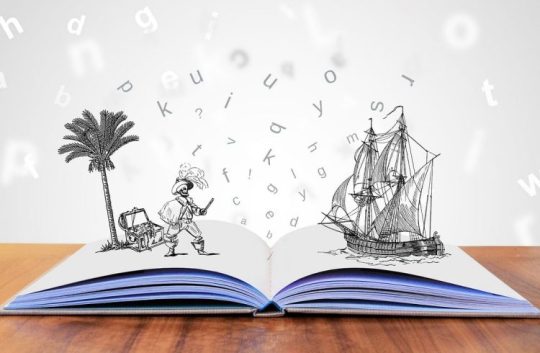
Who Were The Earliest Authors?
July 27, 2023 Caitlin Lynagh
Since writing about book binding and some of the oldest books in the world, it got me thinking about who the first authors were, when were people considered authors, and when did it become a recognised profession?
The earliest author, as considered and still debated by historians, is a woman called Enheduanna. She was a high priestess in the Sumerian city-state of Ur during the reign of her father, Sargon of Akkad during 2334 – 2279 B.C. A number of works in Sumerian literature appear to feature Enheduanna as the first person narrator, but works that have been attributed to her, were written by scribes six centuries after she lived. However, Enheduanna probably wasn’t considered an author during the time she was alive, even if she did write several works.
The Bible is Perhaps the most important and the best-selling book of all time. Both the Old and New Testament were finished by the end of the 2nd Century and were written by many authors over a period of 1,500 years. Moses supposedly wrote portions of scripture, and others were named with their ‘books’ or ‘Gospels’. However, scholars believe that the Gospels and books of the New Testament were not actually written by the people to whom they are attributed, and it is quite possible this is true for the Old Testament too. It appears that Bible writers came from all walks of life during different time periods and with different governments. You can find lists of Old and New Testament authors online, but again it is unlikely that any of these authors were considered authors professionally during their lifetime.
Before the invention of mechanical printing, and of course the Gutenberg Press, books were handmade. During the 4th Century, medieval books were made by scribes copying text by hand from original editions. Cassiodorus made copying biblical texts a compulsory tasks for monks. A monastic scribe would work for at least six hours a day, with the best scribes working even more hours. Scribes were not necessarily authors in their own right but we can definitely call them writers, and thanks to their hard work, a lot of ancient texts were saved and passed on.
Greek and Latin mythical and literary classics were the first texts predominantly copied, but during the 6th Century this shifted to Christian texts due to the rise of the Christian Religion. This saw a decline in Greek and Latin texts until the Carolingian Revival when Emperor Charlemagne pushed for more texts to be copied, restarting the copying of Greek and Latin classics.
The emergence of universities in Europe saw a demand for more books, particularly Bibles and books of law. When the printing press was invented, there were suddenly between eight and twenty-four million new books available in just a few decades. Classical and religious books were produced at first, but around 1484 scientific illustrations and books on Botany were produced. Arguably both an author and a publisher, humanist scholar Erasmus used the new print medium to promote his own ideas by the beginning of the 16th Century. Not everyone was thrilled with the arrival of the printing press, Filippo de Strata wrote ‘the printing press is a whore’ and called for printing to be banned. Others just simply preferred hand-written books, like Vespasian da Bisticci and Federico da Montefeltro, not only because they were beautiful, but also because of their value.
The authors of these Classical texts I keep mentioning, were generally Greek and Roman philosophers or other important people like Sun Tzu, a Chinese military leader who is believed to be the author of ‘The Art Of War’. There was also the Greek physician and botanist, Pedanius Dioscorides, who authored Vienna Dioscorides, a work which lists the medical properties of 383 herbs and 200 plants. The Book of Kells was believed to have been written by Irish Columbian Monks, and of course the Bible had many authors, but it is unlikely that any of these authors were considered professional authors during their lifetimes.
The earliest people who could be considered authors by profession were probably poets, like Homer, who was a Greek Poet and wrote ‘The Iliad’ and ‘The Odyssey’, two epic poems that were the foundations for Greek literature. These ancient poems would have been performed to audiences rather than read. Dante’s Divine Comedy, completed in 1320, inspired generations of poets and Dante himself is considered one of Italy’s greatest poets. Lots of artists, scientists and engineers, wrote books about their work, but were never solely authors by profession. Miguel De Cervantes Saavedra is considered one of the greatest Spanish writers, he wrote Don Quixote, published in two parts in 1605 and 1615. There was also William Shakespeare, an English playwright but definitely a writer and author, who lived between 1564 – 1616. The first folio of Shakespeare’s work was published in 1623.
It’s not until the 18th Century where more people seem to be recognised as authors, with French philosopher and writer Denis Diderot, who wrote plays and novels, and is most famous for his ‘L’Encyclopedie…’ though this was written and completed by more than 150 writers. During this time, Samuel Johnson was an English writer and critic who authored ‘Samuel Johnson’s A Dictionary of the English Language’, and Laurence Sterne, an Irish-born novelist, authored ‘Tristram Shandy’.
Towards the later end of the 18th Century, Thomas Paine rose to fame as a writer and wrote ‘The Rights of Man’, it was a publishing success, selling around 200,000 copies. In it’s day it horrified the authorities and was banned. William Blake lived during this time and wrote poetry, but most of his works went unrecognized until after his death in 1827.
During the 19th Century, Charles Dickens, a famous English novelist wrote many fictional works. His life-long career as a novelist began in 1836 and lasted until the day he died in 1870. Another writer was Harriet Beecher Stowe, she was an American abolitionist who wrote ‘Uncle Tom’s Cabin’, she went on to write 30 books, including novels and memoirs. Walt Whitman, another poet, was an influential voice in American Literature, his book of twelve poems ‘Leaves of Grass’ was published in 1855.
Until the end of the 17th Century, books for children were written mainly for instruction and religious teachings, like Venerable Bede’s 7th Century text on natural science and later the first encyclopaedia written by Anselm for children. Manuals for good conduct were written for children during the 15th and 16th Centuries. Though the first serious children’s author was possibly Charles Perrault who wrote ‘Mother Goose’ for his own children. John Newberry appears to be the first author and bookseller who wrote entertaining children’s book with his ‘Little Pretty Pocket-Book ‘ in 1744. Fairy tales and folktales became increasingly popular, with Grimm’s fairy tales being published in 1812, however you can argue that maybe some of these stories in their original forms aren’t so suitable for children. Lewis Carroll could be considered the most important children’s writer who wrote specifically for entertaining children with his story ‘Alice In Wonderland’ published in 1865.
So the answer to who were the first authors is a complicated one. Storytelling has been around for centuries, and most stories were passed down through generations through word-of-mouth. Some poets wrote down their poetry and some people wrote stories but they were never published or mass produced in the way books are today. Other’s wrote works about their lives and livelihoods but were not necessarily considered authors. The printing press definitely caused a shift that saw people being able to mass produce their writings and spread them to a wider audience quickly. So it’s not really surprising that being an author as a profession, certainly during one’s lifetime was really only possible after this invention. Of course you either had to have your own printing press or convince someone who had one to publish your works.
References:
Books That Changed History
A little history of reading: How the first books came to be | BookTrust
Where Did Writing Come From? (getty.edu)
Medieval Book Production and Monastic Life – Dartmouth Ancient Books Lab
Some Early Professional Authors of the Middle Ages (wondriumdaily.com)
What People said About Books in 1498 (uh.edu)
Children’s literature | History, Books, Types, Awards, & Facts | Britannica
#books#booklr#booklover#bookstagram#blog#authors#writers#writeblr#shakespeare#homer#classical literature
9 notes
·
View notes
Text
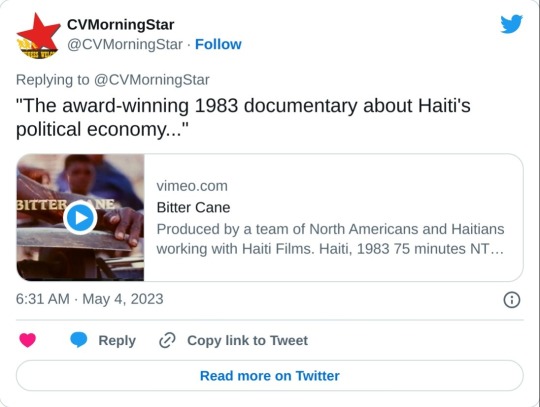
Six years in the making and filmed clandestinely under the Duvalier dictatorship, Bitter Cane is a timeless documentary classic about the exploitation and foreign domination of the Haitian people.
From peasant coffee farms in the rugged tropical mountains to steamy U.S. – owned sweatshops in the teeming capital, the film takes the viewer on a journey through Haitian history to a deeper understanding of that country’s political economy.
We see emerging paths of flight – industries from the U.S., refugees from Haiti – which are having profound effects on both societies.
Production Company: Haiti Films / Crowing Rooster Arts
Produced by a team of North Americans and Haitians working with Haiti Films
Narration: Ben Dupuy, Jean-Claude Martineau
Music: Manno Charlemagne, Nikol Levy, Moumousse and Anayika
© 1983 Haiti Films, Inc.
2 notes
·
View notes
Note
Following your advice I ended up catching up to the latest available chapter of VNC and i’m dying !!!! Murr best character of all times. Roland and Noé are my two big favs with Domi following close behind but everyone is so good, there’s no one I dislike. Mochijun’s power is atounishing,,,,, I love all the researches that have been done about French history and whatnot, it shows in the manga that they’re not going in with a subject they’re ignorant about. The Chasseurs being based on Knights of Charlemagne/Matter of France, I pray that Roland and Oliver won’t die like as in The song of Roland because of Ganelon/Gano ‘s betrayal but 😭 with Gano’s character introduction it is not looking good for them 😭😭
(Admittedly, I started reading Pandora Hearts because VNC was my first time reading Mochijun’s work. I was that swoon though I’m also curious if Mochijun is the type to kill off their characters HAHA)
The church absolutely sucks but Roland’s Christianity is so refreshing, I think VNC and Vinland-saga are the two rare stories in which it makes me take Christianity/Religion a bit more seriously. If you were ever to write that Roland fic please know I’ll be your most excited reader!! Esp given the lack of VNC x reader content (Tho of course don’t force yourself, only if you want to ect ect)
I think your interview is/was today so GOODLUCK I hope everything goes well for you!! Capitalism and work sucks but at least we can travel. Please have fun in Cuba/Italy whenever you get there (I think those were your current destination?) !!!
yes!!!! you caught up!!! mochijun is so good....i'd trust her with my life. i get upset when ppl talk about female mangakas and leave her out considering PH did extremely well in japan. all her characters are >>>> even the antagonists are vv compelling and even then there's never a outright villain bc mochijun likes to play with perspectives and unreliable narrators/narratives a lot and it's great to see that in vnc too!!
fortunately! mochijun isn't as trigger happy as some other mangakas (cough) but there's a reason why all her series are marked tragedy 😭i'm already preparing for some deaths that are definitely going to break my heart 😭😭
my interview was a couple of hours ago and it was a lot more professional than i was expecting (the store is union backed surprisingly) so thank you and everyone else for your good wishes :D
#how are you enjoying pandora hearts??? i think it's one of the greats i bawled my eyes out to it#and YES i need to complete that roland fic i have some BANGER lines in it#plus when else am i going to be able to write a vampire mc!!!#straightpridesatoru
6 notes
·
View notes
Text
"Welcome to the Theatre": Diary of a Broadway Baby
Songs from Pippin: Gala
April 8, 2024 | Symphony Space | Evening | Concert | Gala | 1H 25M
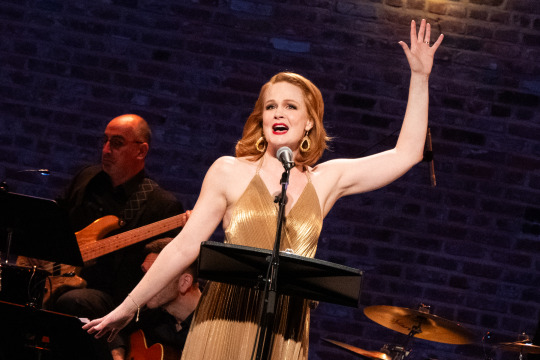
Kate Baldwin, my beloved. Hot morally bankrupt stepmother with homicide-by-proxy tendencies? Ideal character for me. Each year, Symphony Space holds a concert gala to help fund their programing. This year, it was songs from Pippin with a delightful cast of Broadway favorites, including J. Harrison Ghee (Leading Player), Judy Kaye (Berthe), and Christopher Seiber (Charlemagne). Danny Burstein once more narrated. I was, of course, there to gaze in adoration at Kate Baldwin, who got one song and it was worth the whole night alone. The dress above is backless and swishy and she was one of the tallest people on that stage.

Verdict: Why I Love the Theatre
A Note on Ratings
#pippin#symphony space#welcome to the theatre: diary of a broadway baby#kate baldwin i want to climb you like a tree
0 notes
Video
Bitter Cane from Crowing Rooster Arts, Inc. on Vimeo.
Produced by a team of North Americans
and Haitians working with Haiti Films.
Haiti, 1983
75 minutes NTSC
Languages: English or Kreyol
“Excellent and provocative…exceptionally well-crafted.” - L.A. Times
“An outstanding analytical documentary…laid out with impressive clarity… organized with the utmost intelligence…fascinating newsreel footage…convincing.” - Variety
“Thoughtful” - The Village Voice
“Cogently argued…The complex human exploitation involved is made so vivid that the film becomes an especially instructive case history of U.S. – Third World relations.” - Library Journal
“Powerful”
British Film Institute
Six years in the making and filmed clandestinely under the Duvalier dictatorship, Bitter Cane is a timeless documentary classic about the exploitation and foreign domination of the Haitian people.
From peasant coffee farms in the rugged tropical mountains to steamy U.S. – owned sweatshops in the teeming capital, the film takes the viewer on a journey through Haitian history to a deeper understanding of that country’s political economy.
We see emerging paths of flight – industries from the U.S., refugees from Haiti – which are having profound effects on both societies.
Production Company: Haiti Films / Crowing Rooster Arts
Produced by a team of North Americans and Haitians working with Haiti Films
Narration: Ben Dupuy, Jean-Claude Martineau
Music: Manno Charlemagne, Nikol Levy, Moumousse and Anayika
© 1983 Haiti Films, Inc.
0 notes
Text

Listen you can't give me a 2,00 meter tall lad when my baby boy is 1,50m you simply can't
Charlemagne from @owlfromthemeadow again because Cube™
And my blind Narrator who doesn't have any other name 😔
They are both confused lkjlkjlk
(and I am HIGHLY amused haha)
Reblog it! I dare you 💜
#the stanley parable#the stanley parable narrator#tspud narrator#tsp narrator#stanley parable#admin art#/ i dont know how to draw my narrys hair from the back im sorry it looks bad lkjjkljlkj#narrator charlemagne#narrator vince
69 notes
·
View notes
Text
What the hell's going on?!
Can someone tell me please?
Why I'm switching faster than the channels on TV?
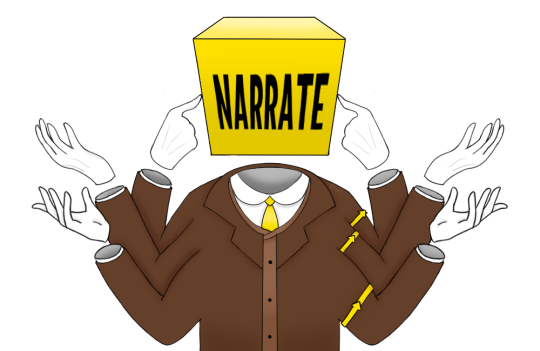
So proud of this one, actually! Hope you guys like it <3
#charlemagne#owl's hoots#owl's art#my art#tsp#tsp narrator#tsp art#tspud#tspud narrator#tsp fanart#the beginner's guide#echo vocaloid
118 notes
·
View notes
Text

literally some spanish officer calls him by his real name and he accidentallyish set the entire Spanish galleon (and maybe others docked nearby) on fire.
officer: Charlemagne Victor Boshaw the 4th?
sharky who has been trying to get kicked out of the Navy since the day he joined: I killed the last man who called me that

me: no you didn’t.
Narrator vc: Two hours later. oH no. Everything’s on fire.
Sharky: I’m not saying it was me. I’m just saying I’m--- *runs away and leaves town*
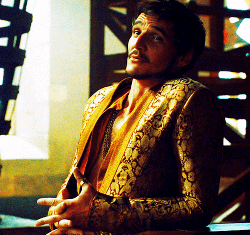
#I laugh now that I have Sharky as a muse when that's my mun name and I'm like -- yeah I too am a pyro...#not like him tho LOL#iM JUST SAYING i think we all deserve a chaotic pirate sharky in our lives#and i need no excuse to use Obery.n gifs#crack#but not really#im serious ASDFGHJ#ANSWERED. [ ask and ye shall receive ]#ANON. [ omg who said that? are you a ghost? ]
1 note
·
View note
Text
Orlando Furioso is a story that is rife in Arthurian references. Which makes sense, because 1) Ariosto loved making references to many things (greek & roman mythology being his second biggest source) and 2) Charlemagne's takes & King Arthur's tales have been ripping each other off for centuries at this point. Merlin is the most proheminent figure, indirectly helping out Bradamante, but others are referenced all the time- Rinaldo shows up in Tristan's castle, Arthus is mentioned a couple times, Morgan's sisters physically show up, and I'm pretty sure Gawain and Lancelot are mentioned too.
"Okay, cool," you ask, "but why do I care?"
Because Angelica is Guinevere.
I don't mean that literally, mind you. While it would not be out of place in this story, Angelica is not actually a 500+yo immortal lady fresh out of Camlann.
What I mean, however, is that they both have similar roles in the story.
Full disclaimer that as with all Arthuriana, Guinevere's characterisation is funky at best, but Guinevere is, first and foremost, a symbol. She's a tool leading to the fall of Camelot or a prop for Lancelot if you're currently promoting courtly love. What she wants doesn't matter.
Angelica is someone who was sent to Charlemagne's court specifically to sow discord with her beauty. The entire purpose of her visit here is to seduce enough people to throw the court into disarray. She was sent there by her father. She had no choice in that matter, and once in court she had no choice but to bow to these new suittors too, smile and giggle and keep people at arm's lenghts because all those knights want you and you know they will not listen if you outright tell them no and some of them have the power to literally tear your limbs off your body, and you are alone because your brother went off and died and there is no one to protect you.
Angelica is Guinevere, and Guinevere caused the demise of everything she has ever touched.
That's why Angelica flees, flees from the court, flees from her suitors, flees from the narrative. What she's running from is her very fate. She is Guinevere, and if she is to make that kingdom fall and drive her suitors to insanity, then fuck it, she wants to at least save herself from misery. Demise might be inevitable, but she wants no part in it. By fucking god, she will escape her fate if this the last thing she ever does. The narrator chases after her, the narrative chases after her, her suitors and monsters and a thousand other beings chase after her, and still she runs. She refuses to be this miserable queen who was denied choice until her end. Angelica grabbed that third option with her bleeding fingers and she held on.
And she succeeds.
82 notes
·
View notes
Note
Could/should Organt be adapted as a movie?
You know, that is... not such a bad idea, actually. It would have to be very postmodernish, because of the non-linear narrative and digressions, but I feel it's doable.
It would be set during Charlemagne's time, but fashion and customs will totally be late 18th century, to keep with the spirit of the text.
True, some things would need to be toned down (*cough* donkey stuff *cough*), but a lot of it can stay as-is.
Oh, and there would also be SJ himself, narrating parts of the story, and also being embarassed about the whole thing.
So, I vote for yes! Let me write the script and cast the lead actor because they never choose the right actors for SJ, and off we go!
#ask#anonymous#saint-just#organt#you do know i will spend hours or maybe days thinking about this#i can't unsee it now#and yes#organt and SJ are playes by the same actor#but we also have the same actress playing nice and perette and maybe another woman#many roles or settings will be doubled or repeated#when someone turns into a donkey they will just be an actor in a donkey costume#and other weird stuff like that#15% rotten on rotten tomatoes#3.5 imdb score#in other words: a cult movie#ok now i really need this thing to happen#i hope sj's ghost will understand#organt adaptation
26 notes
·
View notes